What Is This Thing Called Love?
Sign up for blog updates!
Join my email list to receive updates and information.

I had a friend who thought he’d fallen in love. He told his wife about it, thinking that would be the end of it and he would be on the midnight train to Georgia and a new life with the replacement soulmate. ‘Twas not to be.
The wife wanted to save the marriage and she dragged him to counseling, where my friend was advised that “love is a decision.” The revelation caused him to dump the girlfriend and stick with the wife, to whom he had vowed unceasing fidelity.
Of course, there’s no happy ever-after except in fairy tales, and the wife, rightfully considering herself betrayed, eventually took a lover by way of recompense. Her affair lasted years, unbeknownst to my friend, now a cuckold.
Then there’s the matter of The Reverend Thomas Merton, the celebrity Trappist monk who authored some seventy books of a spiritual/theological/philosophical nature in addition to his memoir, which is still selling in the millions decades after his death.
It seems that monk Merton, who is referred to as a mystic these days, began an affaire de cœur with a student nurse in April 1966 while recovering from back surgery in a Louisville hospital.
The couple’s ardor lasted only a few intense months. Merton says there was no consummation of passion, and he broke it off and recommitted himself to his vows in June 1966.
The reason I bring all this to your attention is not to denigrate the otherwise admirable memory of Merton. Instead, I find myself befuddled.
Why? Because in his journal of April 14,1966, Merton wrote: “One thing has suddenly hit me—that nothing counts except love.”
I wondered why it took this man twenty-five years of eremitical monastic life to reach this conclusion. I assumed that by love he was referring to God, of whom Gospel writer John proclaimed, “God is love.”
Silly me. I hadn’t connected the dots. April 1966 was when Merton’s obsession with his nurse began. Was what “suddenly” hit him in his fifties an infatuation with a woman decades younger than he?
I laid Merton’s experience against my friend’s cuckoldry, and I have come to question if love is, in fact, a decision – or an unintended consequence of the seething sack of chemicals we call our body.
How else to explain the famous, but accurate, reference to “the seven-year itch?”
The phrase can be traced to a 1952 play of the same name. It was popularized by a movie starring Marilyn Monroe.
In a study by Wright State University, an assessment of almost one hundred couples found there were two normal periods of marital decline (measured by passion, satisfaction with the relationship, amount of shared activity, and agreement between the partners).
The research concluded that while the vast majority of marriages begin with a bang – a period of two to three years – this declines as the couple settles into life together.
Not that they’re unhappy. Their hormones are simply regulating as the union becomes routine. This leads to the first period of decline – after about four years of marriage. Another period of decline follows about year eight.
The good news? If a couple survives both of these declines, their risk of divorcing dwindles with every year of marriage after that.
These findings match studies on divorce: most common in the first two years of marriage and again between the fifth and eighth year.
Enough of all this befuddlement. I have to make a decision about what I should believe concerning the nature of love.
I’m going with Eric Fromm’s theory, expounded in his classic work, The Art of Loving. Love is neither feeling nor decision:
“Love isn't something natural. Rather it requires discipline, concentration, patience, faith, and the overcoming of narcissism. It isn't a feeling, it is a practice.”
There. That settles it.

